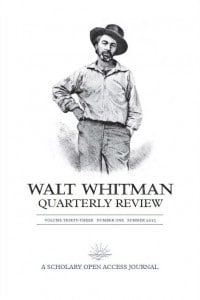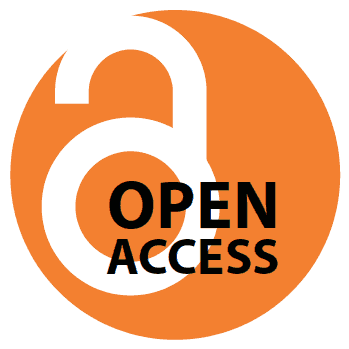 One of the things we do in the Digital Scholarship and Publishing Studio is support locally published journals. The journals which we publish/host are part of Iowa Research Online. During Open Access Week in October, there were several noteworthy additions/changes.
One of the things we do in the Digital Scholarship and Publishing Studio is support locally published journals. The journals which we publish/host are part of Iowa Research Online. During Open Access Week in October, there were several noteworthy additions/changes.
Walt Whitman Quarterly Review became fully open access. We have published the journal in partnership with the Department of English since 2009. Until now, the current year was restricted to print subscribers. Effective with v.33 (2015), the journal is published online only and is freely accessible to everyone. The issue begins with a statement from the editor:
With this inaugural number in our new format, we take an exciting step toward realizing Whitman’s dream of creating a truly democratic literature. For democratic literature to function effectively, he knew, all citizens needed access. Now the contents of every issue of WWQR are available to everyone worldwide who has access to the Web. As access to the Web continues to grow, access to WWQR grows with it. Paid subscriptions to WWQR are now a thing of the past: everyone who wants to read what we publish is a subscriber, and your subscription is free.
Ed Folsom also wrote eloquently about the change in a recent blog post. We are so happy to have supported the journal through this transition of a print+online subscription journal to a fully open access title.
We are also very happy to have added back content of the Iowa Review. Adding this title to Iowa Research Online demonstrates our commitment to support creative works as well as research outputs of the university. The journal’s announcement follows:
The Iowa Review announces the launch of its free digital archive, ir.uiowa.edu/iowareview, containing full text of virtually all the writing published in the magazine from its founding in 1970 through 2011. The archive comprises 130 issues of the magazine and 5,752 individual poems, essays, and stories, searchable by volume, author name, and title. The site also includes links to the most frequently downloaded pieces, as well as a world map displaying real-time readership.
Issues from the most recent three years continue to remain accessible only to subscribers, bookstore patrons, and those who order copies through the Iowa Review’s website, iowareview.org. Excerpts of work from recent issues also appear at iowareview.org.
The Iowa Review partnered with the University of Iowa Libraries’ Iowa Research Online service, which preserves and provides open access to the UI’s scholarly and creative work, and the digital library JSTOR, which creates a digital archive of the magazine’s back issues. UI digital scholarship librarian Wendy Robertson developed the site’s data infrastructure and user interface.
The Iowa Review is based in the Department of English, College of Liberal Arts & Sciences, University of Iowa. It publishes three print issues per year featuring poetry, fiction, creative nonfiction, and photography. Work from its pages is consistently selected to appear in such anthologies as Best American Essays, Best American Short Stories, Best American Poetry, The Pushcart Prize: Best of the Small Presses, and The PEN/O. Henry Prize Stories.
More information about The Iowa Review, including how to subscribe, purchase individual issues, or find the current issue in a bookstore, can be found at iowareview.org. The archive can be accessed directly at ir.uiowa.edu/iowareview.
We are thrilled that everyone in the world will be able to read the fiction, poetry, creative nonfiction and translations included in this well respected literary journal.
Finally, we also published a new issue of the journal Dada/Surrealism, with the theme “From Dada to Infra-noir: Dada, Surrealism, and Romania.” As the articles are being published incrementally, a few articles are not yet posted, making this a soft release. The issue is so large that there are almost two dozen articles already posted! Dada/Surrealism was a print title from 1971–1990. In 2013, publication began again as an online only title. The journal is edited by Timothy Shipe, the Curator of the International Dada Archive.


